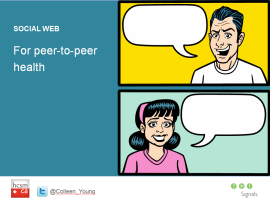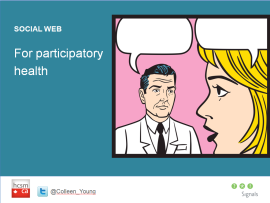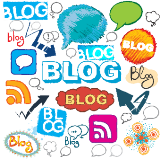I was honoured to represent the healthcare sector at Social Media Week Toronto. For the SMWTO official lauch event, PulseCheck, organizers invited 10 representatives from 10 industries to present a 5-minute candid point of view on the status of their industry on the social web – only 3 slides allowed. I choose to talk about online patient communities, the role of providers in patient sharing online and “infoveillance“.
I was honoured to represent the healthcare sector at Social Media Week Toronto. For the SMWTO official lauch event, PulseCheck, organizers invited 10 representatives from 10 industries to present a 5-minute candid point of view on the status of their industry on the social web – only 3 slides allowed. I choose to talk about online patient communities, the role of providers in patient sharing online and “infoveillance“. I was surprised to realize how new these concepts were to so many people not involved in health care social media conversations. But it resonated loudly and clearly, encouraging us to keep talking about it.
For the record, here’s what I said:
 The Social Web for Peer-to-peer Healthcare
The Social Web for Peer-to-peer Healthcare
Susan Sontag wrote: “Everyone who is born holds dual citizenship, in the kingdom of the well and in the kingdom of the sick. Although we all prefer to use only the good passport, sooner or later each of us is obliged, at least for a spell, to identify ourselves as citizens of that other place.”
So what do we do when we get dropped into the kingdom of the sick? We band together. We call and search and text. We consult experts. And our number one objective – get the hell out of the kingdom of the sick and back to the kingdom of the well.
Thanks to the social web people from around the world come together to share information and support. Technology can organize our collective knowledge and make this user-generated information useful and accessible to many. We are building networks online that we tap into when we need help or advice.(1)
In January 2007, Dave deBronkart was diagnosed with a rare kidney cancer and given only 24 weeks to live. His doctor, Danny Sands, prescribed ACOR, an online community for people with cancer. Yes, an online community! From that community of peers, Dave found information that couldn’t be found anywhere else on credible information websites. He was told about a treatment that sometimes works. Community members were quick to point out that the treatment often doesn’t work and that’s why most hospitals don’t offer it and won’t tell you about it. He opted to try the treatment and sought out a cancer centre where he could get the chemotherapy. His last treatment was July 23, 2007, and by September it was clear he was in remission.
For many, Dave is the epitome of an e-patient. While you may be quick to assume e equals electronic, it doesn’t. The e-patient is equipped, enabled, empowered and engaged in their health and healthcare decisions. They have moved mountains via the social web for their own health and the health of others.
 The Social Web for Participatory Health
The Social Web for Participatory Health
Providers who recognize the value of collective health knowledge are pioneering participatory medicine and accepting patients and caregivers as respected and equal partners in their care.
Understanding the potential of peer-to-peer health has led to social health innovation in patient-provider communication and patient self-care. There are too many innovations to mention today, but I’ll touch on a few quickly.
Dr. Joseph Cafazzo and his team at Centre for Global eHealth Innovation at Toronto’s University Health Network partnered with SickKids Hospital to develop BANT, an iPhone app for teenagers with type 1 diabetes. It allows them to capture, store and analyze their glucose readings, and facilitates sharing this information with their healthcare providers. But just as importantly, they can connect with others like them in the diabetes community and take part in gamification activities that encourage their self-care.
Shared electronic health records like Sunnybrook’s MyChart allow patients and their healthcare providers access to their health information as well as to social sharing tools like clinic notes, personal social networks, medical networks and e-messaging.
The Social Web for Public Health
Social health innovation has also been a driver in public health.
Dr. Gunter Eysenbach’s research into the analysis of search, communication and publication behaviour on the Internet led to a fundamental change to global health surveillance. Thanks to this senior scientist from the Centre for Global eHealth Innovation, epidemic intelligence now flows not only through government organizations but also through informal channels, ranging from press reports to social media streams to analyses of Web searches.(2) (3)
For example, when Rumi Chunara, research fellow at Harvard Medical School, and his team analyzed news and Twitter feeds during the early days of the cholera epidemic in Haiti in 2010, they were able to mine for valuable information on the outbreak up to two weeks ahead of surveillance reports issued by the government health ministry. Such social media surveillance has become much more mainstream and encourage development of free tools like healthmap.org and Outbreaks Near Me.
Conclusion
Healthcare providers remain the experts in disease, but recognize that we are the experts in ourselves. Trained professionals give us information and recommended actions to help us
- stay out of the kingdom of the sick,
- leave the kingdom of the sick, or
- live the best quality of life in the kingdom of the sick.
But, it is social health that has increased our ability to quickly and easily get information and support to help us manage our care, our health and our living as it applies to our individual situation. That means we can share not only with people like us, but also collaborate with people who may know more than we do and help inform people who haven’t been there yet.
(1) Adapted with permission from Susannah Fox’s closing keynote Peer-to-peer Healthcare at Medicine 2.0
(2) Eysenbach G. Infodemiology: Tracking Flu-Related Searches on the Web for Syndromic Surveillance. Proc AMIA Symp 2006
(3) Eysenbach G. J Med Internet Res 2009;11(1):e11
Special thanks to Signals for designing the slides.







